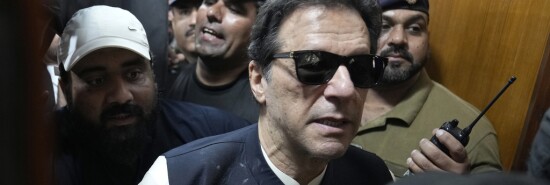
America can’t be indifferent to the snuffing out of democracy in Pakistan
Dan Hannan
Video Embed
A couple of weeks ago, I organized a Zoom meeting for British Conservative members of Parliament to talk to Imran Khan, the former prime minister of Pakistan, who is now under house arrest. A few minutes before the meeting began, the authorities got wind of what we were doing and cut off all communications to his compound.
It was a small thing (trivial, really, given what is going on in Pakistan), but it served to remind us of what a country looks like without the rule of law. The people in charge get to make up the rules as they go along.
DEMOCRATS OPTIMISTIC AS JULIE SU’S LABOR NOMINATION LANGUISHES SENATE
Khan, one of the greatest cricketers in history, was elected in 2018 on his third attempt. He had done something extraordinary in a Pakistani context, building a political movement up from the ground up rather than making alliances with local potentates. He inherited a dire economic situation, but played the hand he had been dealt deftly. Pakistan was doing well before the pandemic — although all that has gone into reverse now.
In April 2022, Khan became the latest in a succession of civilian leaders to be removed by Pakistan’s generals. Rumor has it that the top brass had become nervous about his anti-corruption rhetoric. Whatever the explanation, a confidence vote was manufactured, and an alternative coalition was put in place.
Past coups have had a measure of public support in Pakistan. Not this time. Two-thirds of Pakistanis are under the age of 45, and they are having none of it. It immediately became clear that Khan would win any future election with a landslide — at which point, the iron fist emerged from the velvet glove. First, there was an attempt on Khan’s life. Then absurd charges began to be leveled. When the authorities tried to arrest him, his supporters took to the streets.
Since then, the country has descended into what can only be called martial law. Thousands of Khan’s party members have been seized without due process. Around 80 of his party’s leading figures renounced their membership following threats against their families. Critical journalists have been silenced. Khan himself will almost certainly be disqualified from fighting the next election, either through imprisonment or murder.
The indifference of the West is baffling. The Biden administration makes a big deal of what it calls the Presidential Initiative for Democratic Renewal. In recent weeks, it has imposed sanctions on individuals whom it blames for undermining elections in Nigeria, Bangladesh, and Sudan. But Pakistan? Not a word.
Nor is it just the politicians. When female protesters are beaten by the police in Iran, it is front-page news. When the same thing happens in Pakistan, it is largely ignored.
There are around 650,000 Americans of Pakistani origin and around 1.5 million Brits. My guess is that 80% of both groups are sympathetic to Khan and that 95% worry about the rule of law in Pakistan. On Thursday, Islamabad declared that the diaspora, too, would face prosecution if its members were “found to be involved in instigation, glorification and support” of the protesters.
I suspect the silence is because, both in the United States and in the United Kingdom, the authorities want a working relationship with the real rulers of Pakistan, namely its generals. The military has run that country uninterruptedly since 1958, sometimes stepping in directly, more usually working through favored civilians.
Pakistan’s relationship with its men in uniform is, in some ways, understandable. The country was born in violence and has fought three-and-a-half wars against its much larger Indian neighbor. Pakistani soldiers, many of them graduates of Britain’s officer school at Sandhurst, are impressive professionals. No doubt they have discreetly indicated to their British and American opposite numbers that they regret Khan’s withdrawal from the war on terror. But however good they are as soldiers, they are not fitted to be politicians.
The armed forces (“the boys,” as middle-class Pakistanis sometimes call them) have become economic players, owning businesses and factories that employ veterans on their retirement. They will go to almost any lengths to protect those interests — other than renouncing their commissions and standing for election.
There is no such thing as a good military regime. Whatever the motives of the generals when they start, saving the country from chaos or communism or jihadism, they always end up running kleptocracies.
This, in the end, is what is at stake in Pakistan. Democracy is one of the last things preventing that country from being drawn wholly into China’s orbit. If Pakistan carries on removing popular politicians, the cause of freedom will be set back worldwide. Good news for Vladimir Putin and Xi Jinping, terrible news for the rest of us.
